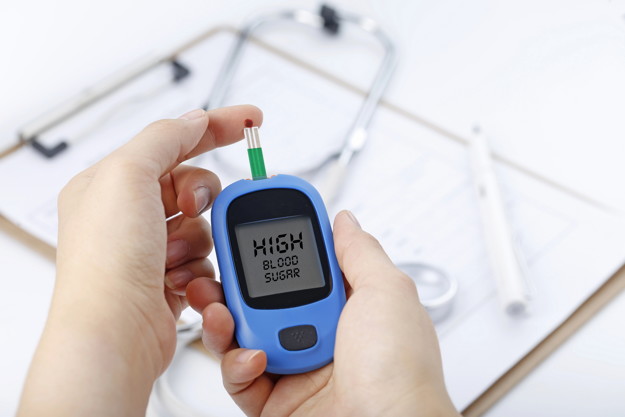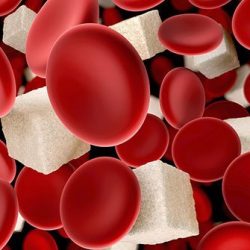
What Is High Blood Sugar?
The condition of high blood sugar level (hyperglycemia) is depicted by the accumulation of excess glucose in the bloodstream. This is a matter of more concern for someone with existing health-conditions The human is body is great at maintaining blood sugar levels in balance, but it fails to do it over-time due to pre-health conditions, sedentary lifestyle, or poor dietary habits.
A person is said to be hyperglycemic if the blood sugar level is more than 180 mg/dL, when measures one or two hours after a meal.
Normal Blood Sugar
Normally, when the glucose enters the blood stream, the pancreas releases the right amount of glucose metabolizing hormones, the hormones the body needs to move glucose from the blood to the cells for energy or storage. In this way, the body naturally keeps the glucose amount in a tight range in the bloodstream.
The healthy ranges of blood sugar are –
Before eating < 100mg/dL
After eating (when measured after one or two hours after a meal) < 140 mg/dL
High Blood Sugar Causes
You may be thinking that high blood sugar occurs just from eating super-sugary food items, but it is not really as easy as that. Undoubtedly, consuming excess sugar in any form will elevate your blood sugar, but there are other reasons too behind the elevation of blood sugar. These reasons are discussed below.
There is a fluctuation in blood sugar all day long. When you eat food, particularly those have rich carbohydrate content such as potatoes, pasta or bread, the blood sugar gets instantly spiked up. Blood sugar also rises when –
- Your medication dosage for existing health conditions needs adjusting
- You’re not following your nutritional plan
- You have an illness or infection
- You’re using certain medications, like steroids
- You’re under physical stress, such as an injury or surgery
- You’re under emotional stress, such as trouble at work or home or with money problems
- Your glucose metabolizing hormones aren’t lasting as long as you think it is
If usually your blood sugar level is well-managed, but still you experience unexplained rise in blood sugar, then there can be one or more acute causes.
Common culprits include:
- Carbs – Carbs are the most well-known issue. Carbs get broken down into glucose rapidly.
- Fruits – Fresh fruits are healthy, however they do contain a sort of sugar considered fructose that raises glucose. Nonetheless, fresh fruits are always better choice over juice, jams, or sticks.
- Juice, aerated beverages, electrolyte drinks, and sweet espresso drinks. These all influence your sugars, so remember to count the carbs in your beverages.
- Liquor – Alcohol raises glucose quickly, particularly when blended in with juice or soda.
- Absence of physical activity- Daily physical active assists pancreas working all the more improvised. Converse with a health care expert to get the exercise plan accommodated.
Symptoms of high blood sugar
Here are the major complications and symptoms of high blood sugar –
You pee a ton and you drink a ton
When there’s an excessive amount of sugar circulating in the blood, the body attempts to dispose of it. It makes you pee every now and again—making the condition bothersome. It can make you truly parched on the grounds that you’re dehydrated. Some people feel starved and may encounter abrupt or unexplained weight reduction in light of the fact that the cells of the body aren’t getting the sugar they need as a fuel source. Numerous individuals don’t realize they have high blood sugar until they’re tried. For other people, the side effects are clear: They pee excessively, they’re getting thirsty, they’re getting up at night to pee, they’re always hungry, and they’re shedding pounds.
You’re tired all the time
On the off chance that your cells aren’t getting glucose, they starve for the energy in real. That can cause you to feel like you’re constantly drained. At the point when your blood is thicker and more viscous because of raised glucose, your heart needs to work more earnestly to pump it and it moves all the more slowly all through your body to convey supplements to the cells. Furthermore, when your body disposes of overabundance sugar in the blood through pee, you literally flush energy out of your body. In addition, expanded thirst and pee implies more night trips to the washroom, interfering with your sleep.
Your blood gets thicker and stickier
Sugary blood has a thicker, stickier consistency. Imagine how hard it can be for thick syrup to get to the tiny point of the little veins—places like the eyes, the ears, the nerves, the kidney, the heart. That is the reason we begin to experience complications in these little veins. Indeed, even in individuals who don’t have pre-health conditions, there is an immediate connection between blood thickness and blood glucose levels.
It can rob your vision
High glucose can genuinely hurt your eye health after some time. One region where little veins get harmed is in the retina, the light-delicate part of the rear of the eye. For the time being, glucose spikes can cause foggy vision.
You have unbearable pain in your extremities
Numb toes and tingling fingers—a condition called peripheral neuropathy—can be an indication that your glucose has been excessively high, for a really long time. The closures of the longest nerve filaments in the body are normally first to suffer. That is the reason the feet, legs, arms, and hands are generally helpless. Nerve harm to the furthest points can deliver a scope of indications, including pain in the extremities. Controlling glucose levels can forestall further harm.
It can impede your personal life
A deficiency of drive or trouble having an erection or a climax can flag that your glucose levels are messed up. Abundance sugar in the blood harms the nerves and veins that assume a critical part in making sex pleasurable or even possible. Men may encounter erectile dysfunction because of vein harm, and some can object to retrograde discharge, in which semen goes to the bladder rather than through the tip of the penis. Ladies may have vaginal dryness, painful intercourse, or decreased sensation in the genital region.
It meddles with your gut
GI issues? The nerves that control inner body capacities, similar to digestion, are defenseless against high glucose levels, as well. Individuals can have serious blockage, regular episodes of loose bowels, or both. Uncontrolled glucose can prompt gastroparesis, a condition where food in the stomach moves gradually to the small digestive system or quits moving out. It cases sickness, pain, bloating or nausea.
It hurts your kidneys
The kidneys house minuscule veins that filters the blood. At the point when glucose is raised, the filtration mechanism basically needs to stay at work past 40 hours to clear the abundance sugar from the blood. Over numerous years, the channels become scarred and the kidneys presently don’t work as expected. Expanded protein level in the pee is one of the primary difficult situations. Controlling glucose and blood sugar can save kidney work. In any case, if years pass by without appropriate glucose control, that scarring can’t be reversed and that is the point at which the kidney work load diminishes. In the long run, the kidneys can quit working entirely, requiring dialysis or transplantation.
Your heart and brain are in danger
Here’s the dreadful truth: People with high blood sugar have notably raised dangers of stroke and coronary episode. Studies show that it’s not bizarre that people with raised blood sugar levels also have a similar degree of blood pressure, cholesterol, and other danger factors for cardiovascular disorders and stroke as others without any pre-medical conditions.
It can influence your memory
A similar vein harm that can cause coronary failures, kidney, and eye medical conditions, can likewise influence your brain. Studies propose individuals with high blood sugar might be at elevated danger for thinking and memory issues—and even Alzheimer’s. Higher glucose levels disable thinking and memory even in individuals who don’t have other health conditions. Over the long run, if your blood glucose is high, you create poor blood-flow, and that can prompt issues with strokes and brain decay and affected memory.
It can mess bladder up
Individuals with high blood sugar are at more serious danger of urinary tract diseases. Not only this, but whenever they get diseases, their issues are more serious. High blood sugar likewise can harm the nerves that control bladder work. The subsequent harm can prompt overactive bladder, trouble controlling the sphincter muscles that help hold and delivery pee, or trouble emptying the bladder.
Your skin gets hammered
Glucose issues can appear in your skin, the body’s biggest organ. At the point when glucose is raised throughout some stretch of time, your body loses liquid and your skin gets dry, broken, and irritated. What’s more, that is only the beginning. Skin issues can be among the principal indications of high blood sugar levels.
6 natural ways to prevent high blood sugar level before it starts
- Cut sugar and refined starches from your eating routine – Eating food varieties high in refined carbs and sugar expands glucose, which may prompt high blood sugar over the long haul. Instances of refined starches include white bread, potatoes and junk or processed food. All things being equal limit sugar and pick complex carbs like vegetables, oats and whole grains.
- Stop smoking – Smoking can add to obstruction in certain pancreatic functions, which can prompt high glucose levels. Quitting tobacco use has been appeared to decrease this danger over the long run.
- Watch your portions – Avoiding huge food portions can help diminish glucose levels and reduction the danger of high blood sugar levels. Eating an excessive amount of food at one time has been appeared to cause higher glucose and hampered blood flow.
- Focus on 30 – Try to be deliberately dynamic by going for a stroll, lifting weights or swimming for 30 minutes, five days of the week. On the off chance that you are indulged in no physical activity—and you sit during the majority of your day—at that point you lead an inactive way of life, a major reason behind high blood sugar levels.
- Drink water – Drinking water rather than different refreshments may help control glucose, subsequently decreasing the danger of health complications. Staying with water assists you with keeping away from refreshments that are high in sugar, additives and other unnecessary ingredients.
- Eat fiber – Getting a lot of fiber is gainful for gut wellbeing and body weight management.
The right management of high blood sugar with Ayurveda
Ayurveda is a sacred remedial science that was established around 5000 years ago in India. According to it, any health issue can be managed and controlled by establishing a balance of the basic elements Vata, Pitta, Kapha in the body.
In Ayurveda, the condition of high blood sugar level is known as ‘MadhuMeh‘. Experts suggest avoiding over-consumption of sweeteners, carbohydrates, red meat, sea-foods, dairy products (which increase cough), lifestyle changes and herbs as Ayurvedic treatment for high blood sugar levels. In Ayurveda, the three fundamental doshas are vata, pitta and kapha and a balance between these three doshas is considered essential for good health. High blood sugar levels in the body may be triggered due to the low function of Agni (digestive fire).
Takeaway!
Ayush82 is offering Ayurvedic medicine that naturally helps manage the rising levels of blood sugar. This medicine is made using with natural extracts of natural herbs that make sure an effective management with no scope for side-effects.


